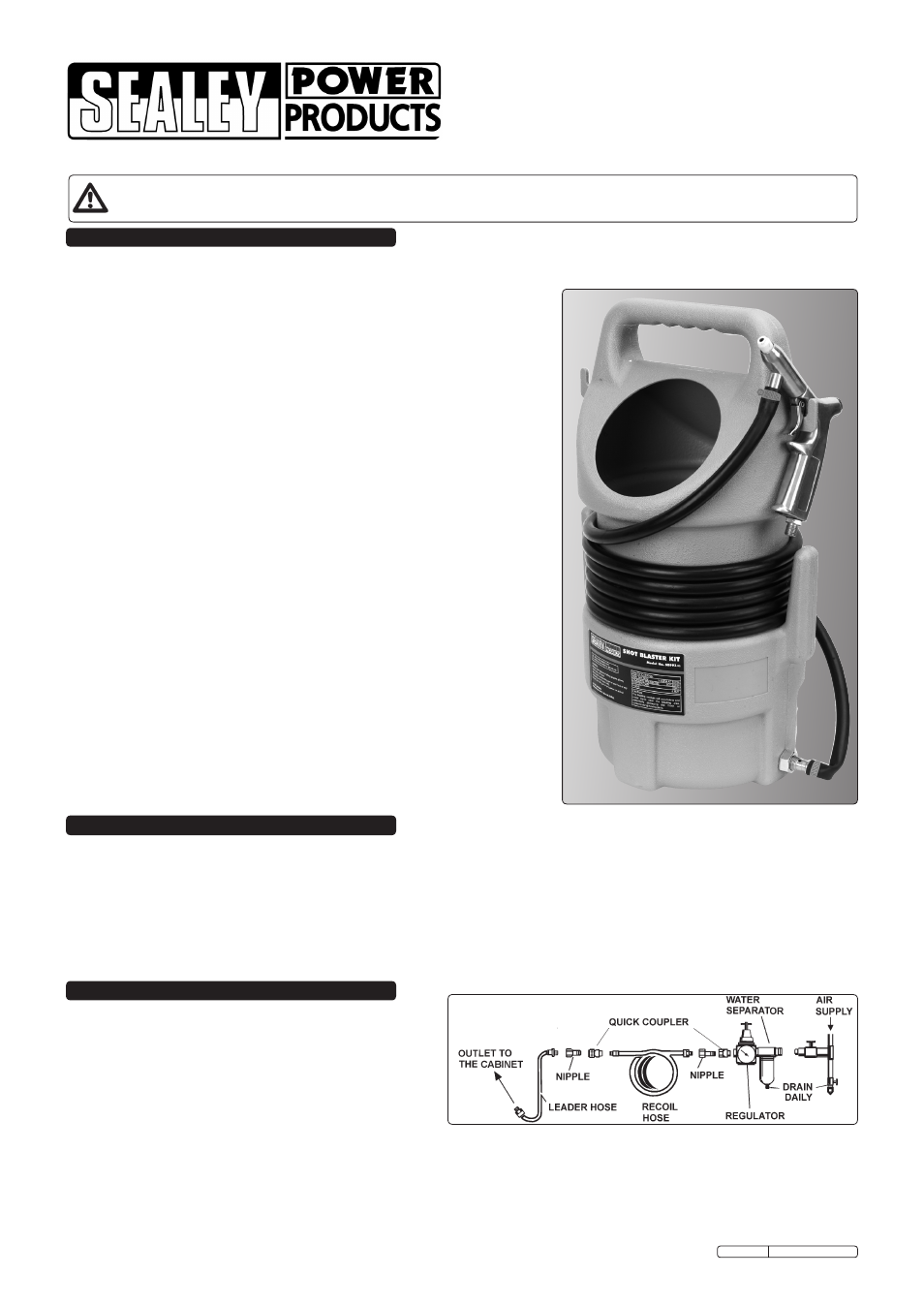Sealey SB993 User Manual
Sb993.v2, Instructions for shot blasting kit model no, Fig.1

Thank you for purchasing a Sealey product. Manufactured to a high standard this product will, if used according to these instructions and properly maintained,
give you years of trouble free performance.
1. SAFETY INSTRUCTIONS
IMPORTANT: PLEASE READ THESE INSTRUCTIONS CAREFULLY. NOTE THE SAFE OPERATIONAL REQUIREMENTS, WARNINGS AND CAUTIONS.
USE THIS PRODUCT CORRECTLY AND WITH CARE FOR THE PURPOSE FOR WHICH IT IS INTENDED. FAILURE TO DO SO MAY CAUSE
DAMAGE AND/OR PERSONAL INJURY AND WILL INVALIDATE THE WARRANTY. PLEASE KEEP INSTRUCTIONS SAFE FOR FUTURE USE.
2. INTRODUCTION & SPECIFICATIONS
3. AIR SUPPLY
WARNING! Turn off, or disconnect from, air supply before servicing or performing any maintenance and when unit is not in use.
WARNING! This shot blasting kit will generate gritty dust which could damage surface finishes and contaminate moving parts. It is
recommended that shot blasting be carried out in a dedicated room free from
unrelated materials, and where there is adequate lighting.
Where this is not possible, consideration should be given to covering exposed
surfaces and masking moving parts as necessary.
WARNING! Wear approved ear, eye, hand and respiratory protection when
operating the blaster. A full range of personal safety equipment is available from your
Sealey dealer.
Maintain correct balance and ensure firm footing.
Spillages of abrasive material, which may be slippery, must be cleaned up
immediately to avoid injury.
Maintain the kit in good condition (use an authorised service agent).
Replace or repair damaged parts. Use recommended parts only. Unauthorised parts
may be dangerous and will invalidate the warranty.
Keep the unit clean for best and safest performance.
Remove ill fitting clothing. Remove ties, watches, rings, and other loose jewellery,
and contain long hair.
Always keep the blast nozzle directed at the workpiece.
If a failure or malfunction occurs
immediately disconnect from air supply.
Keep all other persons away from the working area. Contact with high pressure
blast or inhaling the dust generated is dangerous. If other personnel are required in
the vicinity of the shot blasting then they must wear protective equipment similar to
the operator’s.
DO NOT use the kit for any purpose other than that for which it is designed.
DO NOT operate the kit if any parts are missing or damaged as this may cause
failure and/or personal injury.
DO NOT use any abrasive which contains free silica, as indicated in the Health &
Safety Guidance Note EH59 (available from HMSO).
DO NOT attempt to clear a blocked nozzle while the unit is pressurised.
DO NOT allow untrained persons to operate the blaster.
DO NOT get the kit wet or use in damp or wet locations or areas where there is
condensation.
DO NOT leave the kit operating unattended.
DO NOT operate the kit when you are tired, under the influence of alcohol,
drugs or intoxicating medication.
DO NOT stand on the blaster.
DO NOT direct air from the air hose at yourself or others.
DO NOT operate system with air supply exceeding 120 psi (8bar).
INSTRUCTIONS FOR
SHOT BLASTING KIT
MODEL No:
SB993.V2
fig.1
2.1. Introduction
The SB993.V2 is suitable for stripping rust and paint from wheels, chassis, panels and other corroded or painted surfaces.
2.2. Specifications
Air Pressure: . . . . . . . 50-120psi
Air Consumption: . . . . . . .3.5cfm @ 50psi
Max. Abrasive Capacity: . . . . . . . 22kg
2.3. Abrasives
There are two types of abrasive grit:
a)
Expendable - Use once and dispose of, recommended for large surfaces - Copper Slag and Olivene (silica-free sand).
We recommend Sealey Blasting Grit, part number B/25KG.
b)
Re-usable - more expensive and recommended for cabinets - Glass Beads and Fused Alumina.
WARNING! Ensure the air supply does not exceed 120psi
(8bar) while operating the unit. Too high an air pressure
will shorten the life of the unit due to excessive wear and
may cause damage and/or personal injury.
3.1. Ensure the gun trigger is in the ‘Off’ position before connecting
to the air supply.
3.2. Where possible the compressor should be sited in a separate
room with the connecting airline kept as short as possible.
The compressor should have an air filter and water separator (fig.1).
3.3. Drain the compressor air tank daily. Water in the air line will damage the unit.
3.4. The recommended hook-up procedure is shown in fig.1.
3.5. The minimum hose diameter should be 1/4" I.D. and fittings must have the same inside dimensions.
3.6. Use correct hoses and fittings. DO NOT use quick change couplings as they add weight and can cause failure due to vibration.
Add a leader hose and connect coupling between this and supply hose.
3.7. Keep hoses away from heat, oil and sharp edges. Check hoses for wear and ensure that all connections are secure.
Original Language Version
SB993.V2 Issue: 2 - 19/11/09
